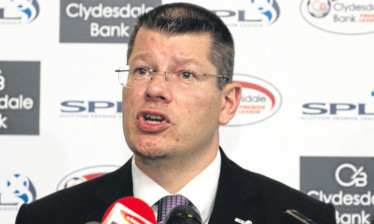
IT was disappointing to learn that Scotland has lost its voice at one of the top tables of European football.
Neil Doncaster was knocked off the board of the European Professional Football League, having failed to garner the support required to stay in place for another three years.
The news particularly hit home with me as, six years ago, I lost my ability to represent the country’s interests on FIFA’s influential Football Committee.
However, there was one big difference in the two cases – I was booted out at the behest of my own Association!
In 2010, I resigned my position as chief executive for the SFA, due to frustrations about the difficulties involved in carrying out the role.
What I didn’t expect is that it would also cost me place in the group of world greats, which then included Pele, Franz Beckenbauer, Eusebio, Dino Zoff and Bobby Charlton.
George Peat, SFA president at the time, wrote to FIFA to ask for my removal from the Committee, a request they agreed to comply with.
His actions were both a surprise and a disappointment to me.
I was the first Scot ever to have a voice on it, something which I regarded as a great honour.
Six years on, I remain the only person from this country to have had a place on the Committee.
During my involvement, I pushed through innovations I felt would help us in Scotland, and the world game, too.
My intention had been to keep working for Scotland after I resigned from the SFA, and I was told by FIFA officials that would not have been an issue.
George Peat’s letter changed all that.
Looking at it now, I can only imagine he did what he did because he was unhappy I decided to quit my SFA post.
That, though, strikes me as a petty thing to do.
While it is in the past now, it is funny the way new developments in the game are brought into sharp focus by the memories of the way things work in football’s upper reaches.
On paper, Doncaster’s failure would appear to be a political one.
He hasn’t been the most popular of officials in the seven years he has been in Scottish football, in his roles as chief executive of first the top flight SPL and then the merged body, the SPFL.
Some would have us believe he has found out he is not as well liked as he would have hoped to be in the continental corridors of power.
There is another possibility.
Namely that Neil Doncaster has been a victim of falling regard for Scottish football outwith these shores.
Certainly Celtic’s success in reaching the group stages of the Champions League this season, and their impressive displays against Manchester City once they got there, have been a big boost for the country.
It is also true the Hoops’ chief executive Peter Lawwell is a man of influence in the European club game.
But we can’t hide from the continued failings of the national team. We haven’t qualified for the Finals of a major tournament since France 1998.
The possibility remains, but only just, that we can end that drought by reaching World Cup 2018.
To do so, though, Gordon Strachan is going to have to turn things around in a quite dramatic fashion.
At club level, for all the efforts of Celtic, the trend in European football is for the rich to not only get richer, but more powerful too.
The big European leagues, jealous of the huge television deal won by English clubs, are demanding bigger and bigger shares of the cake.
So while I understand the desire to find a scapegoat for Scotland’s falling status, and the appeal of casting Doncaster in the role, the real truth may be both more complex and less palatable.

Enjoy the convenience of having The Sunday Post delivered as a digital ePaper straight to your smartphone, tablet or computer.
Subscribe for only £5.49 a month and enjoy all the benefits of the printed paper as a digital replica.
Subscribe